SEO
How to Use Ahrefs and ChatGPT to Improve Your SEO
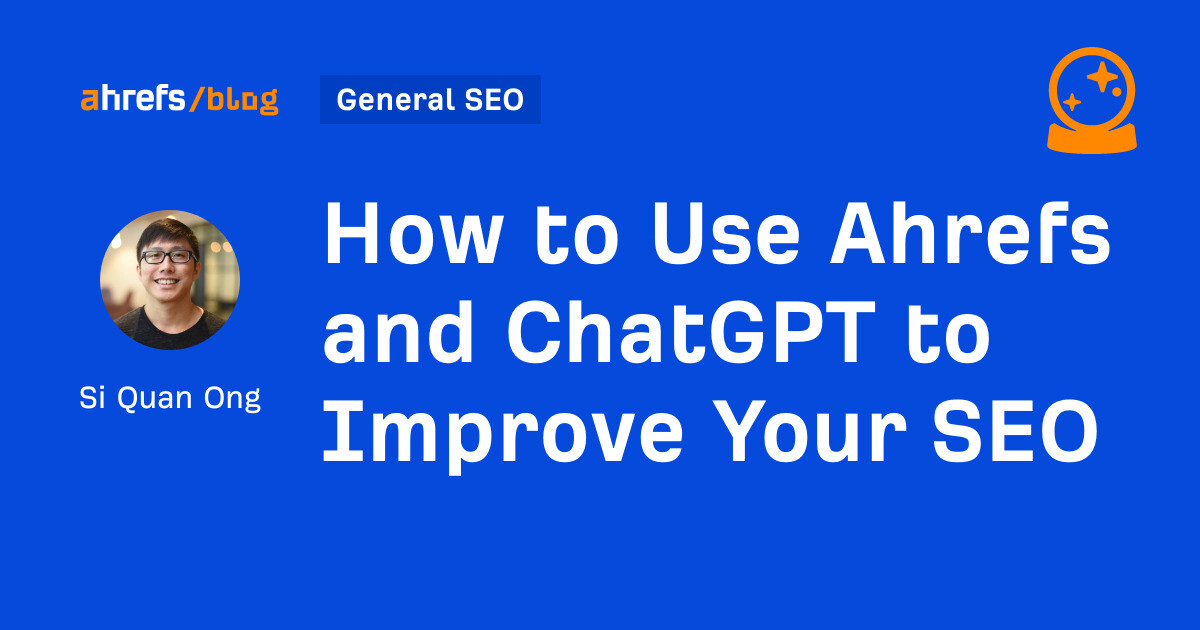
If you’re an Ahrefs user, you can combine our data with ChatGPT to improve your SEO.
Here are some of the best use cases.
If a page is outranking you, it could be because it covers important subtopics searchers want to see (while you don’t).
Here’s how to find these subtopics:
- Enter your target keyword into Keywords Explorer
- Scroll down to SERP Overview
- Check three relevant top-ranking pages
- Click Open in and choose Content gap
The Content gap report shows you the common keyword rankings among these top-ranking pages. Export all keywords from the report. Then, go to ChatGPT and write a prompt like:
I’m going to give you two things.
#1. A blog post on the [topic]
#2. A list of keywords that are related to the topic
I need you to tell me which keywords, entities, or subtopics I’ve missed in my content based on the keyword list.
ChatGPT will tell you what’s missing:
You don’t have to update your content with every “gap” ChatGPT identified. It’s only a suggestion, so identify which ones are most appropriate for your target keyword and refresh your content accordingly.
ChatGPT’s pretty good at creating blog post outlines. But you can make sure ChatGPT’s creating search-optimized outlines by providing it with important subtopics searchers want to see.
Do the same as above by exporting keywords from the Content gap report. Then enter this prompt into ChatGPT:
I’m going to give you a list of keywords related to [topic]. Create an outline for that topic based on these keywords.
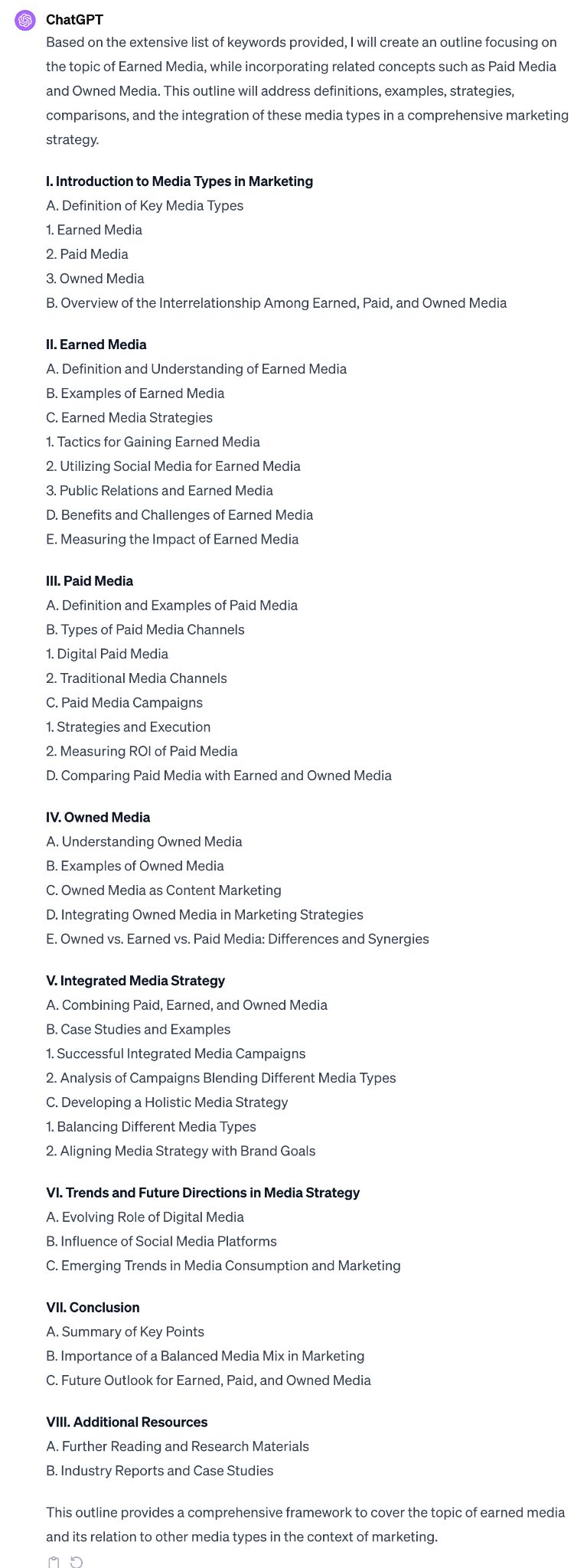

Voila! Your outline is ready.
Search intent is the why behind a query. If you want to stand the best chance of ranking, you’ll need to align your content with search intent.
Typically, search intent is identified by looking at the top-ranking pages for your target keyword.
You can ask ChatGPT to do this for you. Enter your keyword into Keywords Explorer and export the SERPs from SERP Overview.


Copy the top 10 ranking titles and give ChatGPT a prompt like:
I’m going to give you a list of titles. These are the top-ranking pages for the keyword . Can you identify the search intent for me?
ChatGPT will analyze the search intent for you:
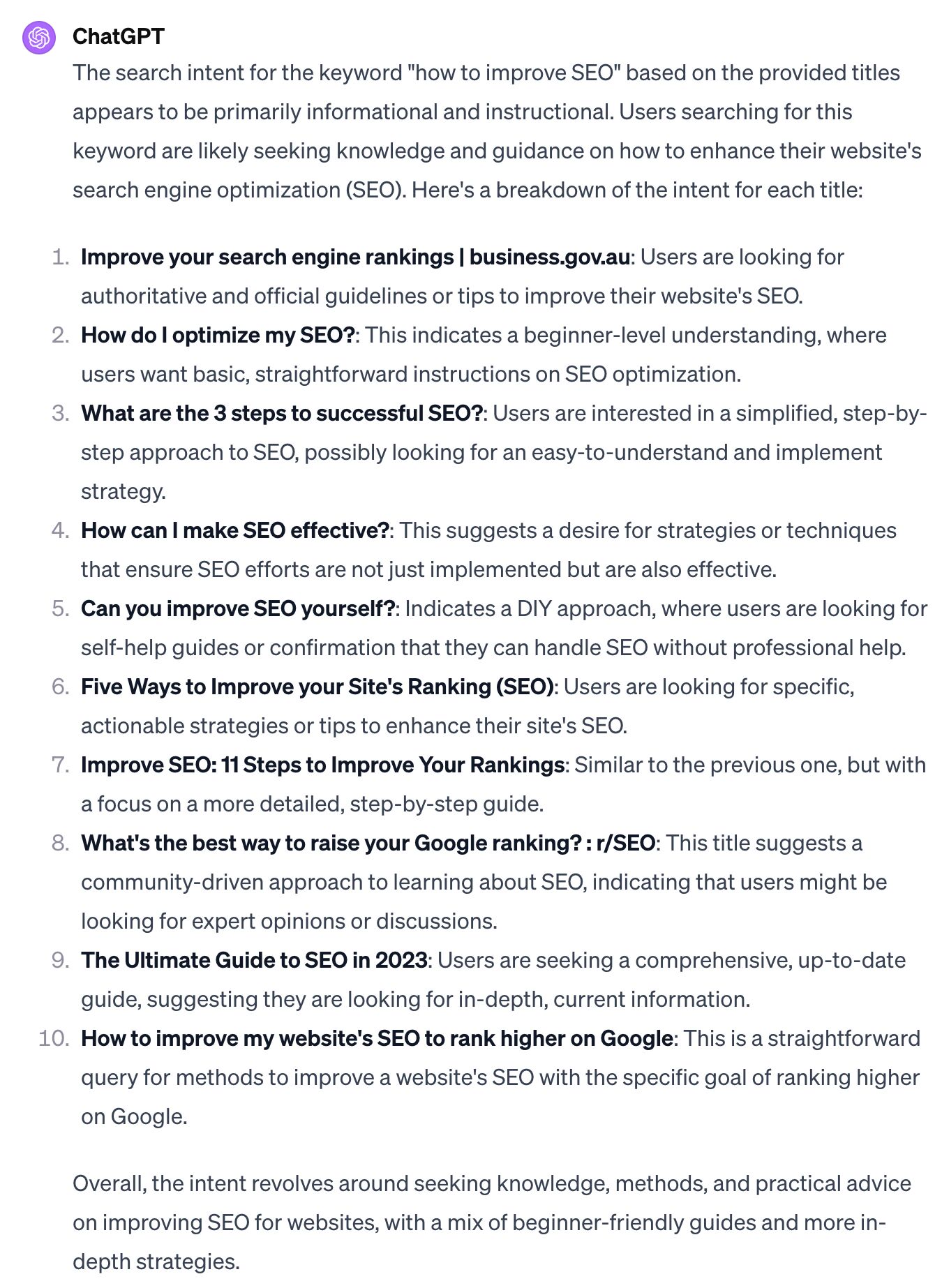

Too troublesome? Good news: We’ve incorporated this use case directly into Keywords Explorer. Just click Identify intents, and we’ll do it for you:
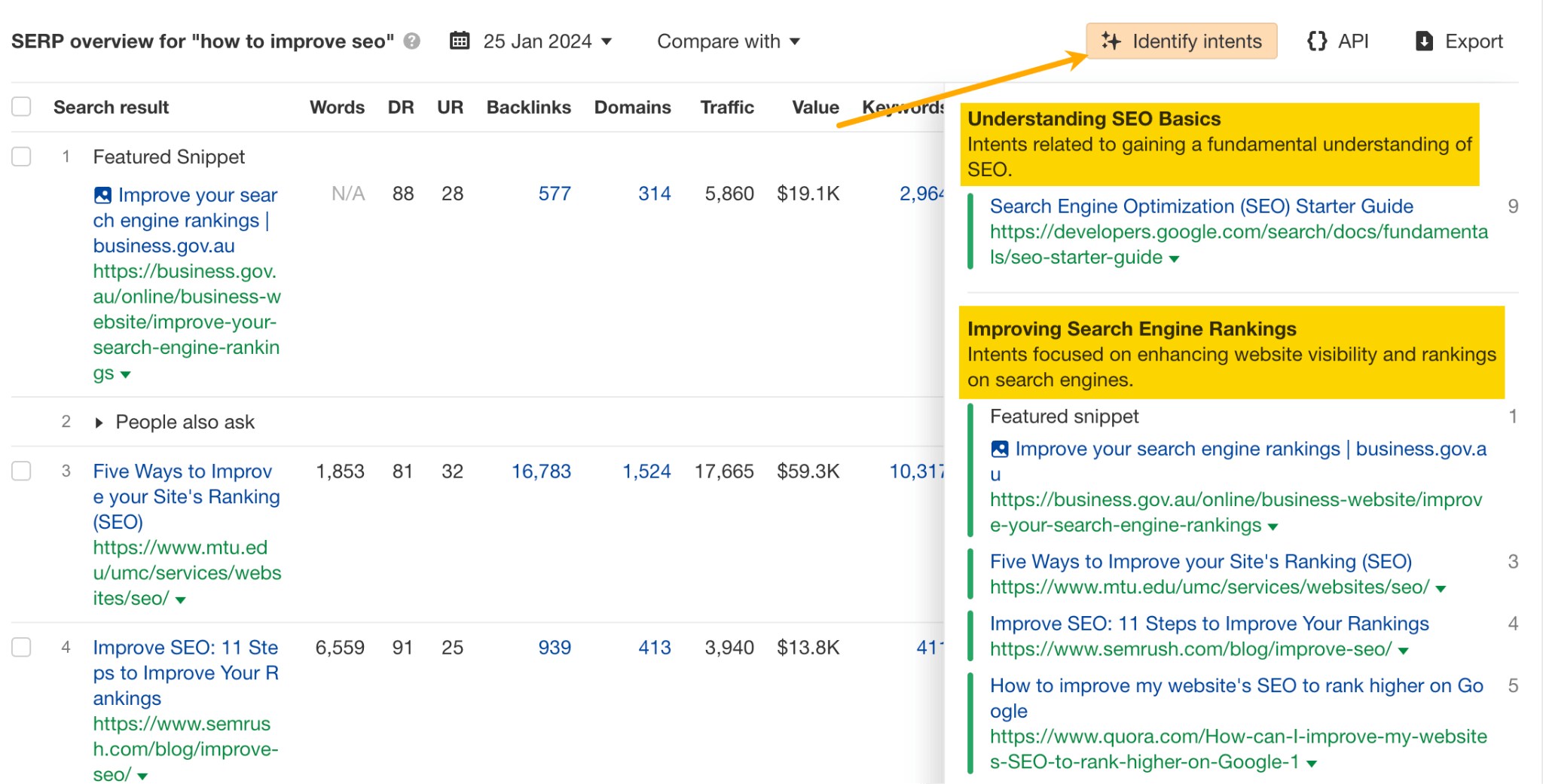

Seed keywords are words or phrases you can use as the starting point in a keyword research process to unlock more keywords.
There are obvious seed keywords for every niche, like “coffee” if you own a coffee site. But you may miss out on terms like “moka pot” or “aeropress,” especially if you’re unfamiliar with the space.
ChatGPT can help with that. Just ask it to give you terms.
Give me terms related to [topic]. Skip the descriptions.


You can then use these as seed keywords in Keywords Explorer to find more keyword ideas.
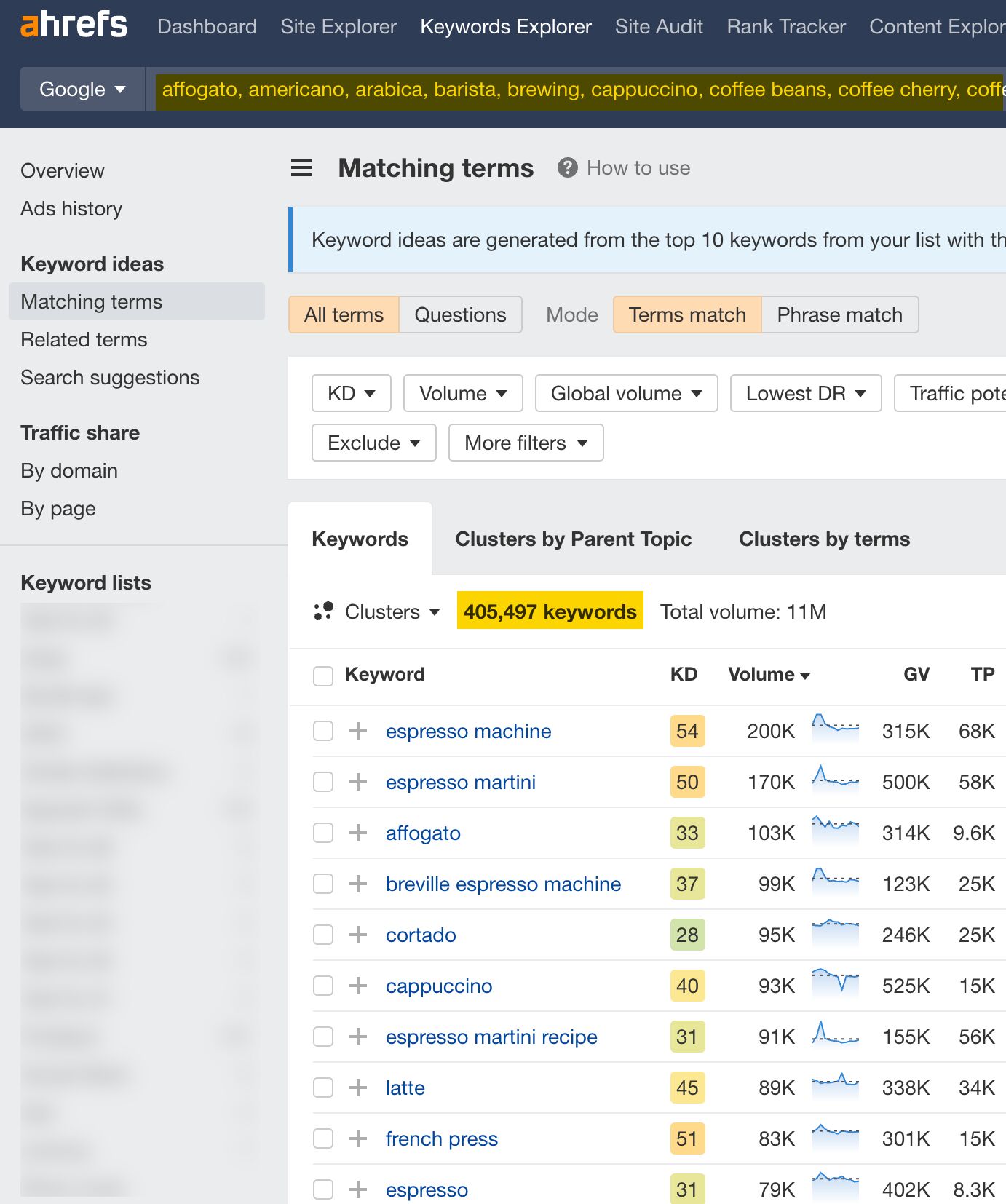

TIP
We’ve integrated AI into Keywords Explorer to help you find seed keywords easily. You can skip the entire ChatGPT part now.
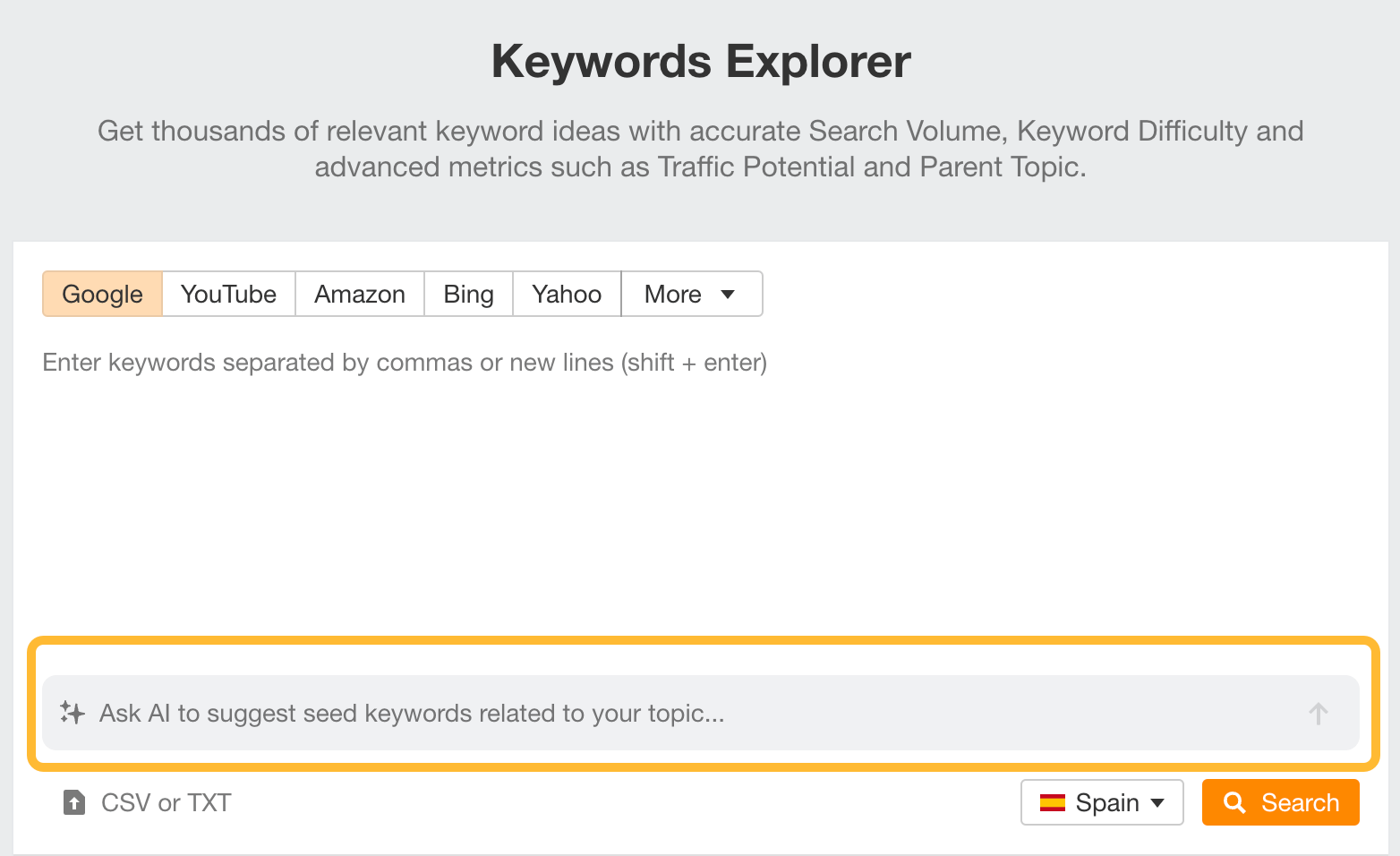

If you do SEO for multiple markets, you may want to target the same keywords in different languages. This is no biggie if you’re a polyglot, but some of us struggle with languages. Fret not: ChatGPT can help.
Take your list of keyword ideas and ask ChatGPT to translate them.
I have a list of search queries in English. If a native Spanish speaker searched for these queries on Google, what keywords would they use? Please suggest one to five of the most common alternative local expressions for each query that reflect their meaning, considering both colloquial and formal terms.
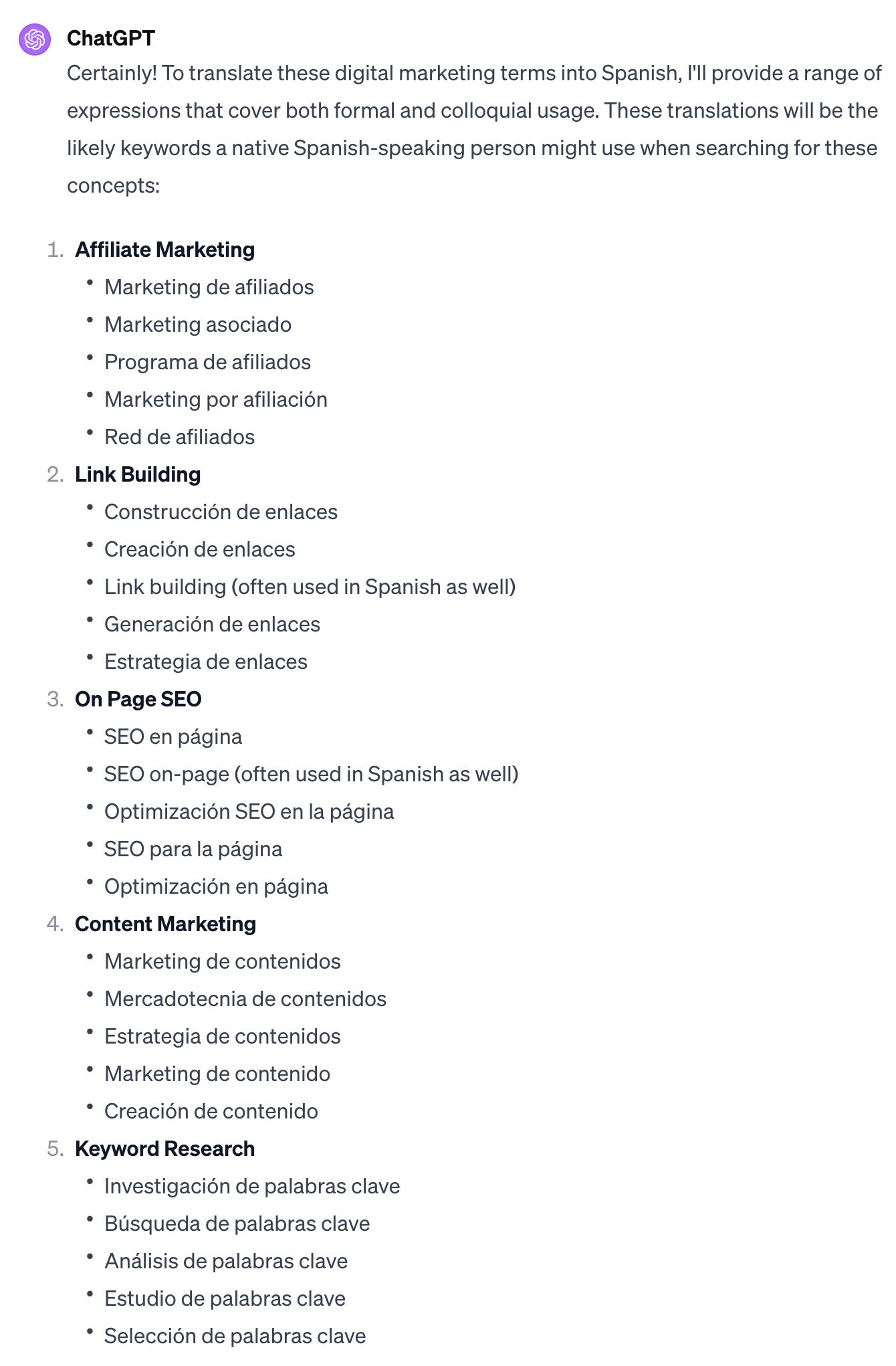

Paste these terms into Keywords Explorer and set the country you’re researching to see if they have any search volume.
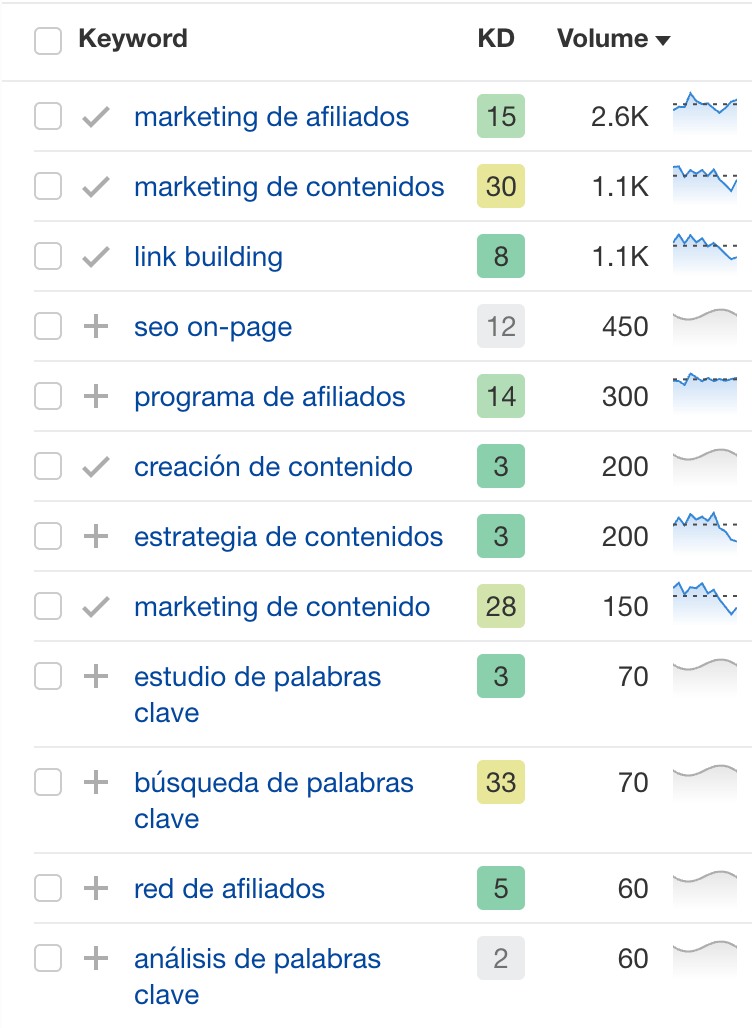

A common issue affecting many websites is missing titles, H1 tags, or meta descriptions. You can find out if your site has these issues by running a crawl with Site Audit.
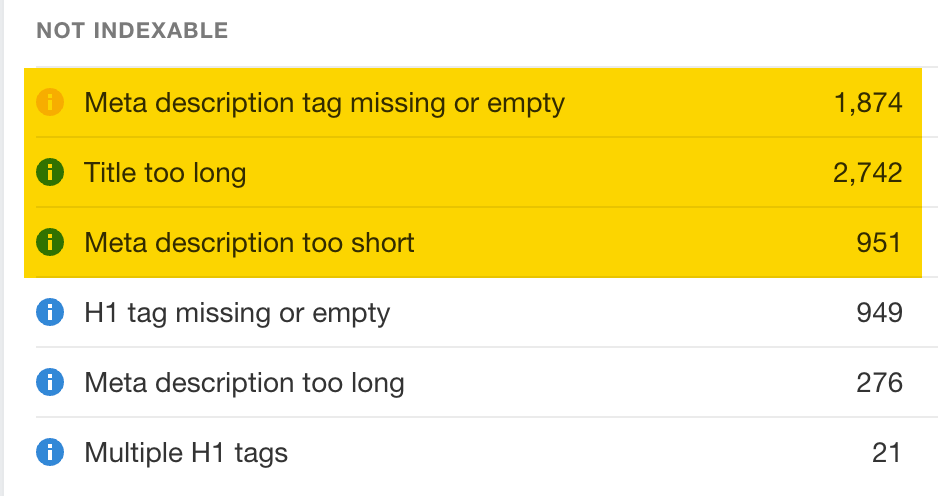

Click the number to see the affected pages. Then click Export to get all the URLs.
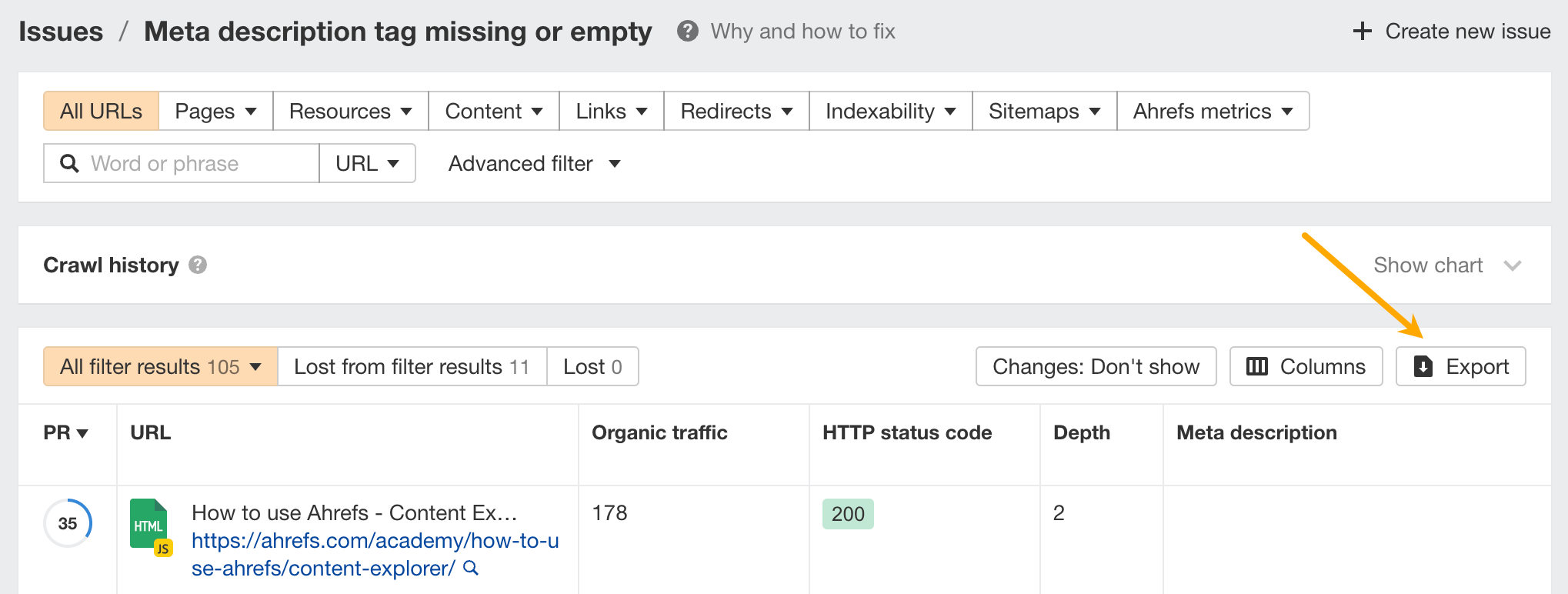

Take these URLs to ChatGPT and ask it to create meta descriptions for you.
I have a list of URLs that do not have meta descriptions. Create meta descriptions for them. Keep them under 160 characters and use an active voice.
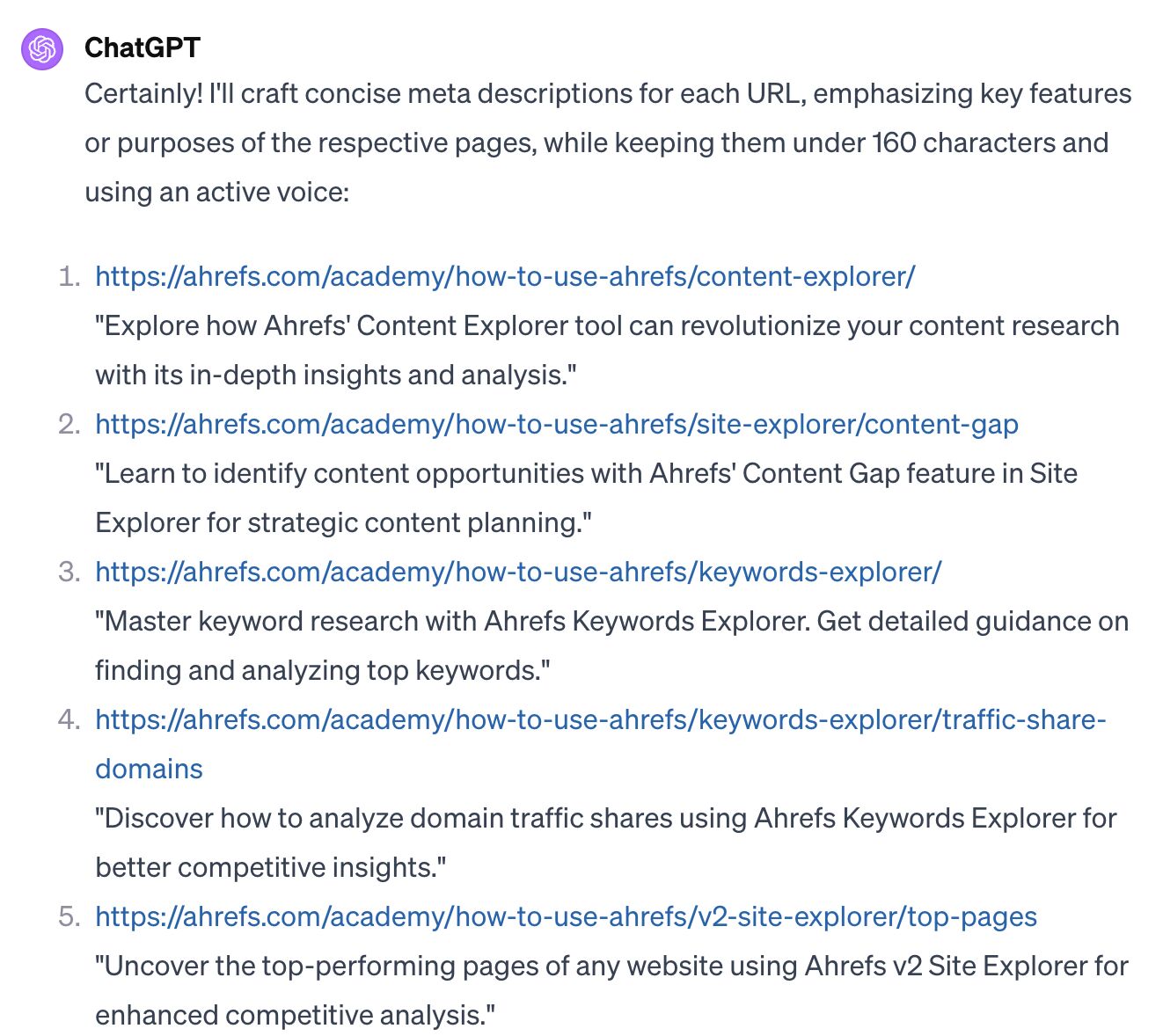

Branded keywords contain your company, service, or product name. Knowing the breakdown between branded and unbranded keywords is useful because:
- If you’re analyzing a competitor, you’ll want to know how much of their traffic is branded (which you can’t replicate).
- Branded traffic may not be directly controlled by SEOs, so you may want to be clear about the attribution.
- Bigger brands get more branded searches (duh!), so it could be a good proxy to see how well your brand is faring.
To see the breakdown, enter your site (or your competitor’s site) into Site Explorer, go to the Organic keywords report, and click Export.


Upload the file to ChatGPT and give this prompt:
Label each keyword in the “Keyword” column as branded or unbranded. Then, create a pie chart that shows the sum of “Current organic traffic” for both categories. Include a legend on the pie chart.
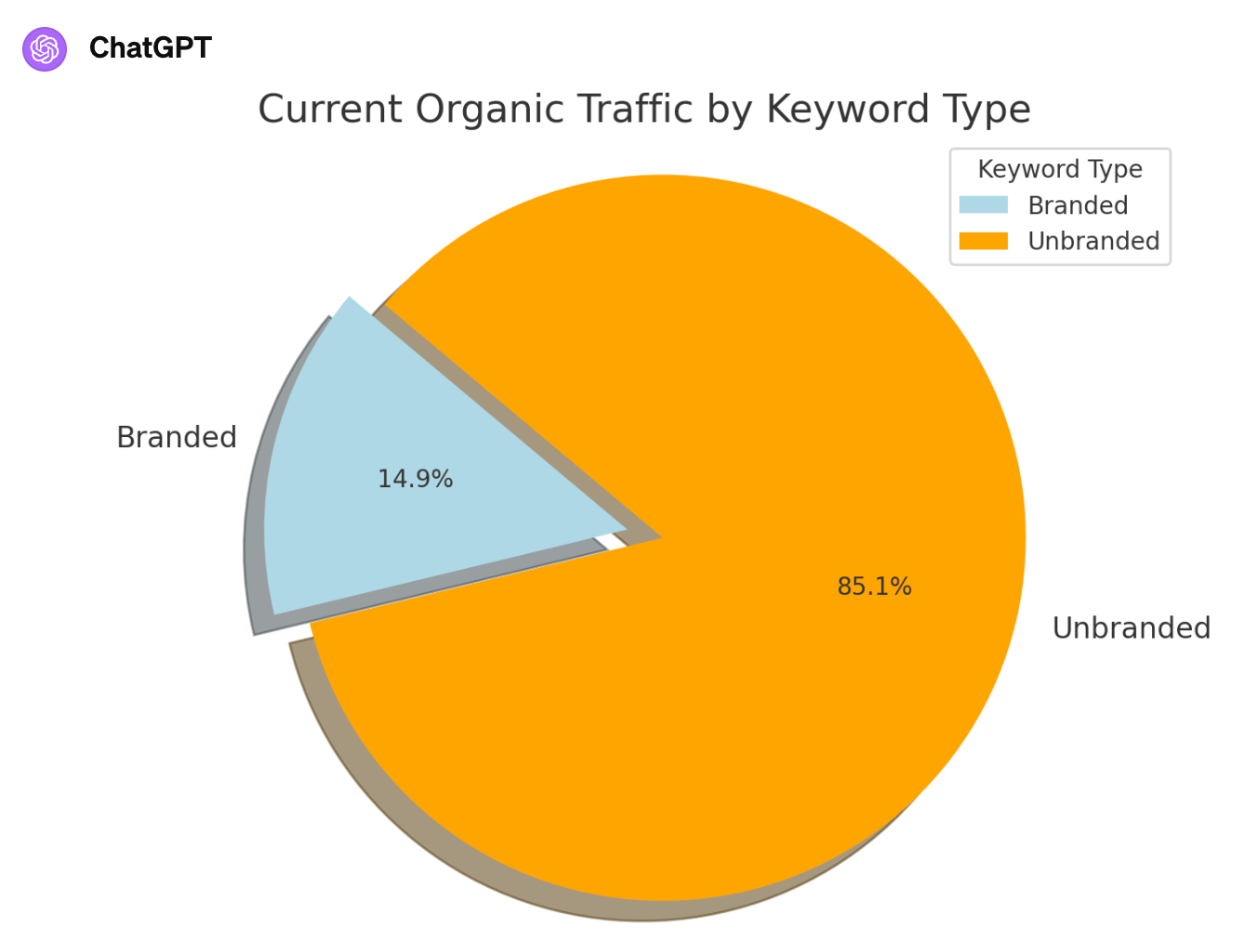

Final thoughts
Ahrefs is not just an SEO tool—it’s a big data machine. So, it’s all about extracting and exporting the most relevant data from our toolset and then using ChatGPT to help with the analysis.
Did I miss out on any cool use cases? Let me know on XTwitter or LinkedIn.
SEO
Google March 2024 Core Update Officially Completed A Week Ago
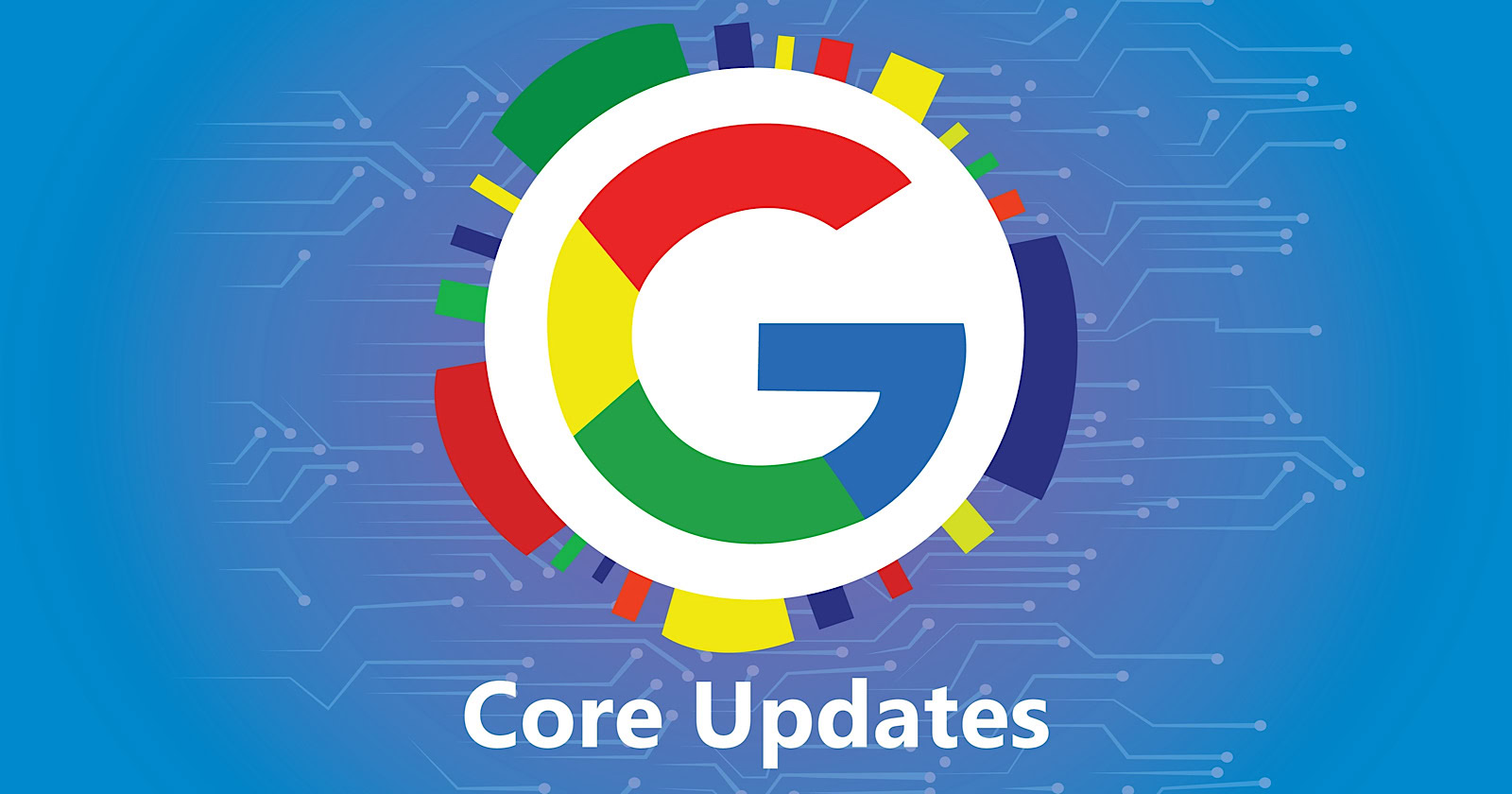
Google has officially completed its March 2024 Core Update, ending over a month of ranking volatility across the web.
However, Google didn’t confirm the rollout’s conclusion on its data anomaly page until April 26—a whole week after the update was completed on April 19.
Many in the SEO community had been speculating for days about whether the turbulent update had wrapped up.
The delayed transparency exemplifies Google’s communication issues with publishers and the need for clarity during core updates
Google March 2024 Core Update Timeline & Status
First announced on March 5, the core algorithm update is complete as of April 19. It took 45 days to complete.
Unlike more routine core refreshes, Google warned this one was more complex.
Google’s documentation reads:
“As this is a complex update, the rollout may take up to a month. It’s likely there will be more fluctuations in rankings than with a regular core update, as different systems get fully updated and reinforce each other.”
The aftershocks were tangible, with some websites reporting losses of over 60% of their organic search traffic, according to data from industry observers.
The ripple effects also led to the deindexing of hundreds of sites that were allegedly violating Google’s guidelines.
Addressing Manipulation Attempts
In its official guidance, Google highlighted the criteria it looks for when targeting link spam and manipulation attempts:
- Creating “low-value content” purely to garner manipulative links and inflate rankings.
- Links intended to boost sites’ rankings artificially, including manipulative outgoing links.
- The “repurposing” of expired domains with radically different content to game search visibility.
The updated guidelines warn:
“Any links that are intended to manipulate rankings in Google Search results may be considered link spam. This includes any behavior that manipulates links to your site or outgoing links from your site.”
John Mueller, a Search Advocate at Google, responded to the turbulence by advising publishers not to make rash changes while the core update was ongoing.
However, he suggested sites could proactively fix issues like unnatural paid links.
“If you have noticed things that are worth improving on your site, I’d go ahead and get things done. The idea is not to make changes just for search engines, right? Your users will be happy if you can make things better even if search engines haven’t updated their view of your site yet.”
Emphasizing Quality Over Links
The core update made notable changes to how Google ranks websites.
Most significantly, Google reduced the importance of links in determining a website’s ranking.
In contrast to the description of links as “an important factor in determining relevancy,” Google’s updated spam policies stripped away the “important” designation, simply calling links “a factor.”
This change aligns with Google’s Gary Illyes’ statements that links aren’t among the top three most influential ranking signals.
Instead, Google is giving more weight to quality, credibility, and substantive content.
Consequently, long-running campaigns favoring low-quality link acquisition and keyword optimizations have been demoted.
With the update complete, SEOs and publishers are left to audit their strategies and websites to ensure alignment with Google’s new perspective on ranking.
Core Update Feedback
Google has opened a ranking feedback form related to this core update.
You can use this form until May 31 to provide feedback to Google’s Search team about any issues noticed after the core update.
While the feedback provided won’t be used to make changes for specific queries or websites, Google says it may help inform general improvements to its search ranking systems for future updates.
Google also updated its help documentation on “Debugging drops in Google Search traffic” to help people understand ranking changes after a core update.
Featured Image: Rohit-Tripathi/Shutterstock
FAQ
After the update, what steps should websites take to align with Google’s new ranking criteria?
After Google’s March 2024 Core Update, websites should:
- Improve the quality, trustworthiness, and depth of their website content.
- Stop heavily focusing on getting as many links as possible and prioritize relevant, high-quality links instead.
- Fix any shady or spam-like SEO tactics on their sites.
- Carefully review their SEO strategies to ensure they follow Google’s new guidelines.
SEO
Google Declares It The “Gemini Era” As Revenue Grows 15%

Alphabet Inc., Google’s parent company, announced its first quarter 2024 financial results today.
While Google reported double-digit growth in key revenue areas, the focus was on its AI developments, dubbed the “Gemini era” by CEO Sundar Pichai.
The Numbers: 15% Revenue Growth, Operating Margins Expand
Alphabet reported Q1 revenues of $80.5 billion, a 15% increase year-over-year, exceeding Wall Street’s projections.
Net income was $23.7 billion, with diluted earnings per share of $1.89. Operating margins expanded to 32%, up from 25% in the prior year.
Ruth Porat, Alphabet’s President and CFO, stated:
“Our strong financial results reflect revenue strength across the company and ongoing efforts to durably reengineer our cost base.”
Google’s core advertising units, such as Search and YouTube, drove growth. Google advertising revenues hit $61.7 billion for the quarter.
The Cloud division also maintained momentum, with revenues of $9.6 billion, up 28% year-over-year.
Pichai highlighted that YouTube and Cloud are expected to exit 2024 at a combined $100 billion annual revenue run rate.
Generative AI Integration in Search
Google experimented with AI-powered features in Search Labs before recently introducing AI overviews into the main search results page.
Regarding the gradual rollout, Pichai states:
“We are being measured in how we do this, focusing on areas where gen AI can improve the Search experience, while also prioritizing traffic to websites and merchants.”
Pichai reports that Google’s generative AI features have answered over a billion queries already:
“We’ve already served billions of queries with our generative AI features. It’s enabling people to access new information, to ask questions in new ways, and to ask more complex questions.”
Google reports increased Search usage and user satisfaction among those interacting with the new AI overview results.
The company also highlighted its “Circle to Search” feature on Android, which allows users to circle objects on their screen or in videos to get instant AI-powered answers via Google Lens.
Reorganizing For The “Gemini Era”
As part of the AI roadmap, Alphabet is consolidating all teams building AI models under the Google DeepMind umbrella.
Pichai revealed that, through hardware and software improvements, the company has reduced machine costs associated with its generative AI search results by 80% over the past year.
He states:
“Our data centers are some of the most high-performing, secure, reliable and efficient in the world. We’ve developed new AI models and algorithms that are more than one hundred times more efficient than they were 18 months ago.
How Will Google Make Money With AI?
Alphabet sees opportunities to monetize AI through its advertising products, Cloud offerings, and subscription services.
Google is integrating Gemini into ad products like Performance Max. The company’s Cloud division is bringing “the best of Google AI” to enterprise customers worldwide.
Google One, the company’s subscription service, surpassed 100 million paid subscribers in Q1 and introduced a new premium plan featuring advanced generative AI capabilities powered by Gemini models.
Future Outlook
Pichai outlined six key advantages positioning Alphabet to lead the “next wave of AI innovation”:
- Research leadership in AI breakthroughs like the multimodal Gemini model
- Robust AI infrastructure and custom TPU chips
- Integrating generative AI into Search to enhance the user experience
- A global product footprint reaching billions
- Streamlined teams and improved execution velocity
- Multiple revenue streams to monetize AI through advertising and cloud
With upcoming events like Google I/O and Google Marketing Live, the company is expected to share further updates on its AI initiatives and product roadmap.
Featured Image: Sergei Elagin/Shutterstock
SEO
brightonSEO Live Blog

Hello everyone. It’s April again, so I’m back in Brighton for another two days of Being the introvert I am, my idea of fun isn’t hanging around our booth all day explaining we’ve run out of t-shirts (seriously, you need to be fast if you want swag!). So I decided to do something useful and live-blog the event instead.
Follow below for talk takeaways and (very) mildly humorous commentary. sun, sea, and SEO!
-
SEARCHENGINES7 days ago
Daily Search Forum Recap: April 19, 2024
-

 MARKETING7 days ago
MARKETING7 days agoBattling for Attention in the 2024 Election Year Media Frenzy
-

 WORDPRESS7 days ago
WORDPRESS7 days ago7 Best WooCommerce Points and Rewards Plugins (Free & Paid)
-

 WORDPRESS6 days ago
WORDPRESS6 days ago13 Best HubSpot Alternatives for 2024 (Free + Paid)
-

 MARKETING6 days ago
MARKETING6 days agoAdvertising in local markets: A playbook for success
-

 SEO7 days ago
SEO7 days agoGoogle Answers Whether Having Two Sites Affects Rankings
-

 SEARCHENGINES6 days ago
SEARCHENGINES6 days agoGoogle Core Update Flux, AdSense Ad Intent, California Link Tax & More
-

 AFFILIATE MARKETING7 days ago
AFFILIATE MARKETING7 days agoGrab Microsoft Project Professional 2021 for $20 During This Flash Sale




![The Current State of Google’s Search Generative Experience [What It Means for SEO in 2024] person typing on laptop with](https://articles.entireweb.com/wp-content/uploads/2024/04/The-Current-State-of-Googles-Search-Generative-Experience-What-It.webp-400x240.webp)
![The Current State of Google’s Search Generative Experience [What It Means for SEO in 2024] person typing on laptop with](https://articles.entireweb.com/wp-content/uploads/2024/04/The-Current-State-of-Googles-Search-Generative-Experience-What-It.webp-80x80.webp)









